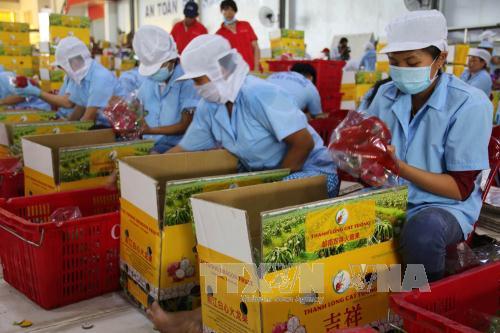
HCM CITY — Ensuring food safety, further enhancing product promotion by attending prestigious fairs and cutting logistics costs are among ways to boost exports of Vietnamese fruits and vegetables to the EU, according to Vietnamese envoys to the EU and businesses.
Speaking at a webinar this week on exporting fruits and vegetables to the EU market, Trần Văn Công, Việt Nam’s agricultural counsellor to the EU, said European countries are currently in the process of economic and consumer recovery.
With its annual fruit and vegetable imports of 35 billion euros, accounting for 40 per cent of global trade in the products, the EU is a promising market for Việt Nam, he said.
Phạm Việt Anh, Việt Nam’s ambassador to the Netherlands, said though the Dutch is small, it has a very important position in Europe as home to wholesalers.
But very few Vietnamese fruit products are available there due to a lack of reliable supply sources, high prices and poor preservation.
If Việt Nam can increase its farming area and meet the standards of the EU market, more of its vegetables and fruits could enter it, he said.
Nguyễn Trung Kiên, Việt Nam’s ambassador to Austria, said European consumers are increasingly attaching importance to food safety and environmental protection, and vegetables and fruits not meeting these criteria would not sell in the EU market.
Meanwhile, major growing areas in Việt Nam such as Bắc Ninh and Bắc Giang face challenges related to food preservation and still use a lot of pesticides, he said.
He called for increasing the use of non-chemical methods for crop protection and insect control for long-term benefits.
Besides the food safety factor, the webinar heard, to promote the export of fruits and vegetables to the EU, trade promotion needs to be strengthened and logistics difficulties need to be resolved.
Thái Xuân Dũng, Việt Nam’s Ambassador Extraordinary and Plenipotentiary to the Czech Republic, said logistics costs account for a high rate of the cost of fruit and vegetable products exported to the Czech market but also the EU in general.
“Processed fruits and vegetables will bring higher added value, and businesses need to invest in technology and equipment to improve the competitiveness of their products and make use of the tariff incentives under the EU-Vietnam Free Trade Agreement to boost exports to the market.”
Nguyễn Đình Tùng, chairman of Vina T&T Group, said, “Exporters must place food safety and hygiene first, and understand regulations for each kind of fruit … to avoid violating them.”
Not having EU officials in Việt Nam for quality inspection of fruits and vegetables before export is a difficulty and exporters run the risk of orders being cancelled on arrival in Europe, he said.
Ngô Tường Vy, deputy director of Chánh Thu Fruit Import-Export Limited Company, said the promotion for Việt Nam's fresh fruits in the EU is quite good, but they still face certain limitations, especially with respect to post-harvest preservation.
Amid the COVID-19 pandemic, her company switched to promoting sales of processed frozen products, and achieved great success, especially with durian products to Australia.
The company wants to enter the EU market in the near future with frozen durian and promote its exports, she said.
Minister of Agriculture and Rural Development Lê Minh Hoan said the potential for exporting vegetables and fruits to the EU is huge, and it is necessary to take advantage of opportunities when the bloc’s economy is recovering.
“Many businesses have paved the way to take fruits to the EU.
“But perhaps we cannot go it alone if we want to go far; we have to go together.
“We must consider the establishment of an export union or association of exporters to the EU to further promote our agricultural products.
“Currently, we lack an overall strategy for exporting fruits to the EU and so developing a strategy by clarifying the roles of relevant stakeholders is needed.” — VNS